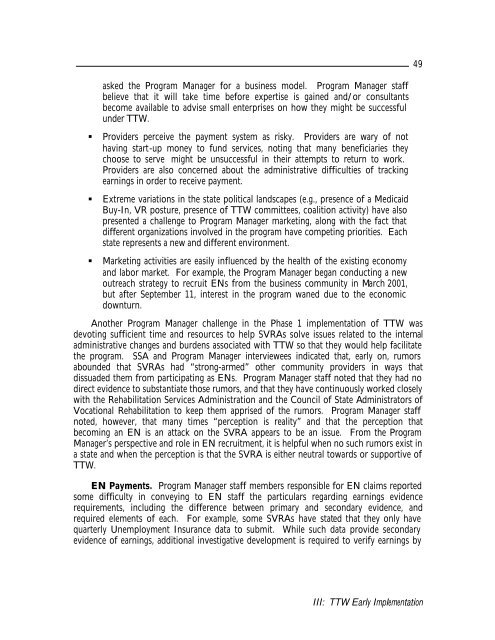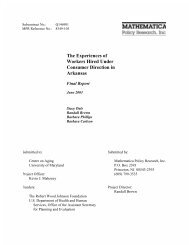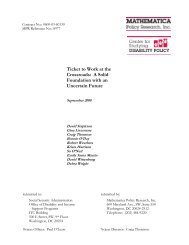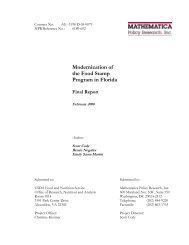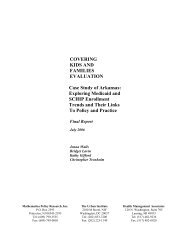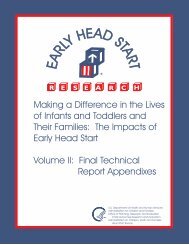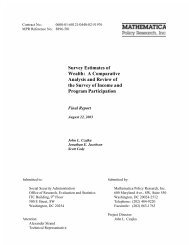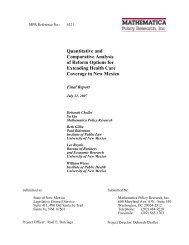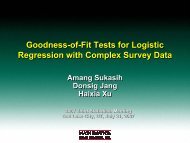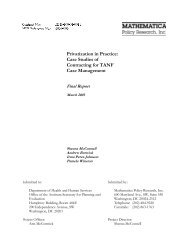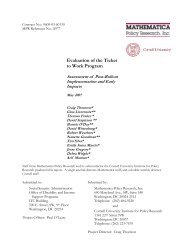Evaluation of the Ticket to Work Program Initial Evaluation Report
Evaluation of the Ticket to Work Program Initial Evaluation Report
Evaluation of the Ticket to Work Program Initial Evaluation Report
Create successful ePaper yourself
Turn your PDF publications into a flip-book with our unique Google optimized e-Paper software.
49<br />
asked <strong>the</strong> <strong>Program</strong> Manager for a business model. <strong>Program</strong> Manager staff<br />
believe that it will take time before expertise is gained and/or consultants<br />
become available <strong>to</strong> advise small enterprises on how <strong>the</strong>y might be successful<br />
under TTW.<br />
• Providers perceive <strong>the</strong> payment system as risky. Providers are wary <strong>of</strong> not<br />
having start-up money <strong>to</strong> fund services, noting that many beneficiaries <strong>the</strong>y<br />
choose <strong>to</strong> serve might be unsuccessful in <strong>the</strong>ir attempts <strong>to</strong> return <strong>to</strong> work.<br />
Providers are also concerned about <strong>the</strong> administrative difficulties <strong>of</strong> tracking<br />
earnings in order <strong>to</strong> receive payment.<br />
• Extreme variations in <strong>the</strong> state political landscapes (e.g., presence <strong>of</strong> a Medicaid<br />
Buy-In, VR posture, presence <strong>of</strong> TTW committees, coalition activity) have also<br />
presented a challenge <strong>to</strong> <strong>Program</strong> Manager marketing, along with <strong>the</strong> fact that<br />
different organizations involved in <strong>the</strong> program have competing priorities. Each<br />
state represents a new and different environment.<br />
• Marketing activities are easily influenced by <strong>the</strong> health <strong>of</strong> <strong>the</strong> existing economy<br />
and labor market. For example, <strong>the</strong> <strong>Program</strong> Manager began conducting a new<br />
outreach strategy <strong>to</strong> recruit ENs from <strong>the</strong> business community in March 2001,<br />
but after September 11, interest in <strong>the</strong> program waned due <strong>to</strong> <strong>the</strong> economic<br />
downturn.<br />
Ano<strong>the</strong>r <strong>Program</strong> Manager challenge in <strong>the</strong> Phase 1 implementation <strong>of</strong> TTW was<br />
devoting sufficient time and resources <strong>to</strong> help SVRAs solve issues related <strong>to</strong> <strong>the</strong> internal<br />
administrative changes and burdens associated with TTW so that <strong>the</strong>y would help facilitate<br />
<strong>the</strong> program. SSA and <strong>Program</strong> Manager interviewees indicated that, early on, rumors<br />
abounded that SVRAs had “strong-armed” o<strong>the</strong>r community providers in ways that<br />
dissuaded <strong>the</strong>m from participating as ENs. <strong>Program</strong> Manager staff noted that <strong>the</strong>y had no<br />
direct evidence <strong>to</strong> substantiate those rumors, and that <strong>the</strong>y have continuously worked closely<br />
with <strong>the</strong> Rehabilitation Services Administration and <strong>the</strong> Council <strong>of</strong> State Administra<strong>to</strong>rs <strong>of</strong><br />
Vocational Rehabilitation <strong>to</strong> keep <strong>the</strong>m apprised <strong>of</strong> <strong>the</strong> rumors. <strong>Program</strong> Manager staff<br />
noted, however, that many times “perception is reality” and that <strong>the</strong> perception that<br />
becoming an EN is an attack on <strong>the</strong> SVRA appears <strong>to</strong> be an issue. From <strong>the</strong> <strong>Program</strong><br />
Manager’s perspective and role in EN recruitment, it is helpful when no such rumors exist in<br />
a state and when <strong>the</strong> perception is that <strong>the</strong> SVRA is ei<strong>the</strong>r neutral <strong>to</strong>wards or supportive <strong>of</strong><br />
TTW.<br />
EN Payments. <strong>Program</strong> Manager staff members responsible for EN claims reported<br />
some difficulty in conveying <strong>to</strong> EN staff <strong>the</strong> particulars regarding earnings evidence<br />
requirements, including <strong>the</strong> difference between primary and secondary evidence, and<br />
required elements <strong>of</strong> each. For example, some SVRAs have stated that <strong>the</strong>y only have<br />
quarterly Unemployment Insurance data <strong>to</strong> submit. While such data provide secondary<br />
evidence <strong>of</strong> earnings, additional investigative development is required <strong>to</strong> verify earnings by<br />
III: TTW Early Implementation


